|
Learn 8 Poems So…..why learn poems?? Well I read somewhere that poets have the uncanny ability to tap into the realm of spirit. Poems enable us to transcend the mundane, and experience the world as we see and feel it. Poets have the ability to turn what to most people, are chaotic thoughts and feelings, into beautiful and meaningful works of art. Poets pass on what they have learned through their words and believe it is their duty to pass it on. All cultures revere their poets, none more so than my own, the Irish. We call them Seanchaí (shan-a-key) meaning the storytellers, the bards and the minstrels. OK, it’s so difficult to pick just 8 poems!! After all, poems are written about all aspects of life and death – love, loss, nature, beauty, human struggle, amusement etc. In Ireland, we are blessed with having some of the world’s best poets that it’s almost impossible to pick only 8!! We learn poems from Primary School upwards……and everyone has a favourite poem/ poet. So forgive me if you don’t see your personal favourite here. I’ve cast the net wider than just Irish poems/ poets….to those that resonate with me. Some I remember from school (thanks to Mrs. Denny) and some I’ve learnt along the way. 3 of the poets I've chosen are called William!! So here are 8 of my favourite poems which are in alphabetical order of the poet’s family name:  Maya Angelou Maya Angelou 1. “Still I Rise” – by Maya Angelou (1928-2014) You may write me down in history With your bitter, twisted lies, You may trod me in the very dirt But still, like dust, I'll rise. Does my sassiness upset you? Why are you beset with gloom? ‘Cause I walk like I've got oil wells Pumping in my living room. Just like moons and like suns, With the certainty of tides, Just like hopes springing high, Still I'll rise. Did you want to see me broken? Bowed head and lowered eyes? Shoulders falling down like teardrops, Weakened by my soulful cries? Does my haughtiness offend you? Don't you take it awful hard ’Cause I laugh like I've got gold mines Diggin’ in my own backyard. You may shoot me with your words, You may cut me with your eyes, You may kill me with your hatefulness, But still, like air, I’ll rise. Does my sexiness upset you? Does it come as a surprise That I dance like I've got diamonds At the meeting of my thighs? Out of the huts of history’s shame I rise Up from a past that’s rooted in pain I rise I'm a black ocean, leaping and wide, Welling and swelling I bear in the tide. Leaving behind nights of terror and fear I rise Into a daybreak that’s wondrously clear I rise Bringing the gifts that my ancestors gave, I am the dream and the hope of the slave. I rise I rise I rise. Maya Angelou, "Still I Rise" from And Still I Rise: A Book of Poems. Copyright © 1978 by Maya Angelou. Used by permission of Random House, an imprint and division of Penguin Random House LLC. All rights reserved. Source: The Complete Collected Poems of Maya Angelou (1994) Meaning “Still I Rise” is an empowering poem about the struggle to overcome prejudice, injustice and misogyny. It champions self-respect and confidence. It is one of Maya Angelou’s most popular poems. You can overcome pretty much anything if you have high self-esteem. It is a beacon of hope for the oppressed and downtrodden. 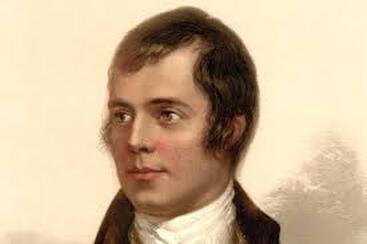 Robert Burns Robert Burns 2 . “A Red, Red Rose,” by Robert Burns (1759-1796) O my Luve is like a red, red rose That’s newly sprung in June; O my Luve is like the melody That’s sweetly played in tune. So fair art thou, my bonnie lass, So deep in luve am I; And I will luve thee still, my dear, Till a’ the seas gang dry. Till a’ the seas gang dry, my dear, And the rocks melt wi’ the sun; I will love thee still, my dear, While the sands o’ life shall run. And fare thee weel, my only luve! And fare thee weel awhile! And I will come again, my luve, Though it were ten thousand mile. Meaning This is one of those poems that has stayed with me from Secondary School. Burns’ best-known poem besides “Auld Lang Syne” is a simple declaration of feeling. “How beautiful and delightful is my love,” he says. “You are so lovely, in fact, that I will love you to the end of time. And even though we are parting now, I will return, no matter what.” All this is expressed in a breath-taking excess of metaphor: “And I will love thee still, my dear, / Till a’ the seas gang dry.” This poem has no peer as a simple cry of a young man who knows no boundaries. 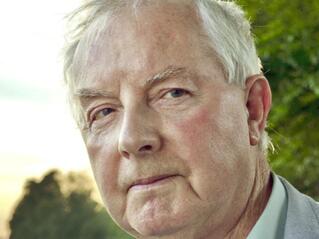 Michael Coady Michael Coady 3. “Naming Names” by Michael Coady Dead Bell Lousy Town Black Ink Foot of Ebb Flash Colours Make it the Two Long Distance Cursèd Good-Lookin’ Hard Lines Stand Back Cracked Eggs Hand on Flap Cat Out Belly o’ Pups Dead Man Top o’ the Pot Wobbler Feathery Tom the Bard Axle Ginchy Bucket o’ Blood Hambone Hawkeye Live Wire Sugar Goitre Stab the Rasher Barrel Oblong Slobbery Gob Meaning The above poem is a series of Nicknames of characters from my hometown of Carrick-on-Suir. All of the characters in the poem are real, and while some of the names are revealing, others remain a mystery even to the poet. Some are not lacking in imagination, but are still clear in meaning. Feathery was the name given to a bird fancier, while a local electrician was known to all as Live Wire. In a small town where surnames and forenames are duplicated, sometimes a nickname is the only way of deciphering who’s who …..so if you have an unusual mannerism or physical attribute this is often used ….no place for the faint-hearted! A name derived in Primary School can follow you (and even your children) throughout life. So much so that the original name becomes forgotten in the town! Michael Coady, "Naming Names" from Oven Lane. Copyright © 1987 by Michael Coady. Used by permission of The Gallery Press. All rights reserved. Source: Oven Lane (1987) 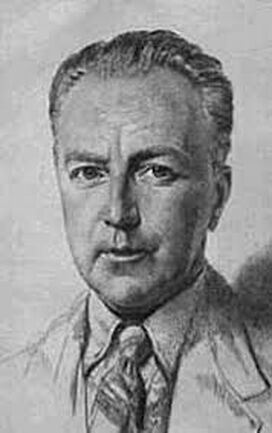 Oliver St. John Gogarty Oliver St. John Gogarty 4. “Per Iter Tenebricosum” by Oliver St. John Gogarty (1878 – 1957) Enough! Why should a man bemoan A Fate that leads the natural way? Or think himself a worthier one Than those who braved it in their day? If only gladiators died Or heroes, Death would be his pride; But have not little maidens gone, And Lesbia's sparrow - all alone? Meaning This is another poem that has stayed with me since Mrs. Denny’s English class. By coincidence I worked in an office for 18 years beside a pub in Temple Bar, Dublin 2, called after the said poet!! His poem deals with the futility of fearing or complaining about death as it’s the natural ending for us all. Even for little treasured birds. 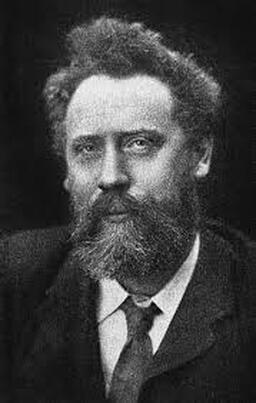 William Ernest Henley William Ernest Henley 5. “Invictus” by William Ernest Henley Out of the night that covers me, Black as the pit from pole to pole, I thank whatever gods may be For my unconquerable soul. In the fell clutch of circumstance I have not winced nor cried aloud. Under the bludgeonings of chance My head is bloody, but unbowed. Beyond this place of wrath and tears Looms but the Horror of the shade, And yet the menace of the years Finds and shall find me unafraid. It matters not how strait the gate, How charged with punishments the scroll, I am the master of my fate, I am the captain of my soul. Meaning: This poem is featured in the 1989 film Invictus about the events in South Africa before and during the 1995 Rugby World Cup; this poem is said to have inspired Nelson Mandela during his time in prison. The poem outlines that we’re not promised a life absent of trials and suffering. While horrific events have sidelined many men, this poet, William Ernest Henley refused to be crushed by hardship. As a young man he contracted tuberculosis of the bone, which resulted in the amputation of the lower part of one of his legs. The disease flared up again in Henley’s twenties, compromising his other good leg, which doctors also wished to amputate. Henley successfully fought to save the leg, and while enduring a three-year hospitalisation, he wrote “Invictus” — a stirring charge to remember that we are not merely given over to our fates. While life can be “nasty, brutish, and short,” we cannot sit idle while waves crash against us. A product of Victorian stoicism, and lived struggle, Henley’s poem is a clarion call to resist and persevere through the hardest of trials.  Rudyard Kipling Rudyard Kipling 6. “If-” - by Rudyard Kipling (1865 – 1936) If you can keep your head when all about you Are losing theirs and blaming it on you, If you can trust yourself when all men doubt you, But make allowance for their doubting too; If you can wait and not be tired by waiting, Or being lied about, don’t deal in lies, Or being hated, don’t give way to hating, And yet don’t look too good, nor talk too wise: If you can dream—and not make dreams your master; If you can think—and not make thoughts your aim; If you can meet with Triumph and Disaster And treat those two impostors just the same; If you can bear to hear the truth you’ve spoken Twisted by knaves to make a trap for fools, Or watch the things you gave your life to, broken, And stoop and build ’em up with worn-out tools: If you can make one heap of all your winnings And risk it on one turn of pitch-and-toss, And lose, and start again at your beginnings And never breathe a word about your loss; If you can force your heart and nerve and sinew To serve your turn long after they are gone, And so hold on when there is nothing in you Except the Will which says to them: “Hold on!” If you can talk with crowds and keep your virtue, Or walk with Kings—nor lose the common touch, If neither foes nor loving friends can hurt you, If all men count with you, but none too much; If you can fill the unforgiving minute With sixty seconds’ worth of distance run, Yours is the Earth and everything that’s in it, And—which is more—you’ll be a Man, my son! Meaning Many people consider this poem to be one of the most inspirational, and the poem has garnered much attention in popular culture. In fact, any lover of tennis can probably tell you that several of the poem’s lines are hanging in the player’s entrance at Centre Court Wimbledon in England. The lines that are displayed read, “If you can meet with triumph and disaster and treat those two impostors just the same.” Throughout the poem, there are multiple scenarios, both positive and negative, along with a glimpse into how one should conduct oneself. The poem has an almost mathematical proof about it with its if-then scenario. Kipling leaves the “then” until the final two lines, revealing that if he or she is able to do all that was just mentioned, he or she will not only have the world at his or her fingertips, but he or she will also be a “Man.”  William Shakespeare William Shakespeare 7. “Let Me Not to the Marriage of True Minds” (Sonnet 116) by William Shakespeare (1564-1616) Let me not to the marriage of true minds Admit impediments. Love is not love Which alters when it alteration finds; Or bends with the remover to remove. O no! It is an ever-fixed mark That looks on tempests and is never shaken; It is the star to every wand’ring bark, Whose worth’s unknown, although his height be taken. Love’s not Time’s fool, though rosy lips and cheeks Within his bending sickle’s compass come; Love alters not with his brief hours and weeks, But bears it out even to the edge of doom. If this be error and upon me proved; I never writ, nor no man ever loved. Meaning This poem is a universal definition of love, which the poet defines as constant and unchangeable in the face of any circumstances. It is like the North Star, he says, which, even if we don’t know anything else about it, we know where it is, and that’s all we need. Even death cannot lord itself over love, which persists to the end of time itself. The final couplet strongly reaffirms this. It seems that Shakespeare may be talking about a deeper layer of love, transcending sensual attraction and intimacy, something more akin to compassion or benevolence for your fellow man. In this revelation of the nature of such a force, from which common love is derived, lies Shakespeare’s genius.  William Wordsworth William Wordsworth 8. “Daffodils” by William Wordsworth (1770-1850) I wandered lonely as a cloud That floats on high o’er vales and hills, When all at once I saw a crowd, A host, of golden daffodils; Beside the lake, beneath the trees, Fluttering and dancing in the breeze. Continuous as the stars that shine And twinkle on the milky way, They stretched in never-ending line Along the margin of a bay: Ten thousand saw I at a glance, Tossing their heads in sprightly dance. The waves beside them danced; but they Out-did the sparkling waves in glee: A poet could not but be gay, In such a jocund company: I gazed—and gazed—but little thought What wealth the show to me had brought: For oft, when on my couch I lie In vacant or in pensive mood, They flash upon that inward eye Which is the bliss of solitude; And then my heart with pleasure fills, And dances with the daffodils. Meaning of the Poem This poem pops into my head on the first sight of spring each year. In this poem we are presented with the power and beauty of the natural world. It sounds simple enough, but there are several factors that contribute to this poem’s greatness. First, the poem comes at a time when the Western world is industrialising and man feels spiritually lonely in the face of an increasingly godless worldview. This feeling is perfectly harnessed by the depiction of wandering through the wilderness “lonely as a cloud” and by the ending scene of the narrator sadly lying on his couch “in vacant or in pensive mood” and finding happiness in solitude. The daffodils then become more than nature; they become a companion and a source of personal joy. The very simplicity itself of enjoying nature—flowers, trees, the sea, the sky, the mountains etc.—is perfectly manifested by the simplicity of the poem: the four stanzas simply begin with daffodils, describe daffodils, compare daffodils to something else, and end on daffodils, respectively. Any reader can easily get this poem, as easily as he or she might enjoy a walk around a lake. Bucket List Items Ticked Off in the above Blog post Number 24 - Creative - Learn 8 Poems Other Blog Posts Blog 11 - Sydney, Australia Blog 12 - Hong Kong, China Post your own best love poem pick or list in the comments section below. If you liked this post, please share. Sharing is caring 😊
1 Comment
30/12/2020 08:02:06
Maya Angelou remains to be my favorite poet of all time. I absolutely admire her because she dedicated her whole life fighting for the rights of the people. She was selfless in her battles and made sure that everyone knew that she was there to support them. It is never easy to fight for other people's rights because you will be criticized by so many people. But, Maya Angelou never cared about what people will say about her. Rather, she cared about helping those who are in need of her guidance.
Reply
Leave a Reply. |
AuthorMy name is Mary and this is my bucket list blog ...having survived a near-death experience. I hope it encourages you to "live your best life". See how I'm completing my own bucket list items. And let me know how you're getting on with yours! Archives
July 2024
Categories
All
|
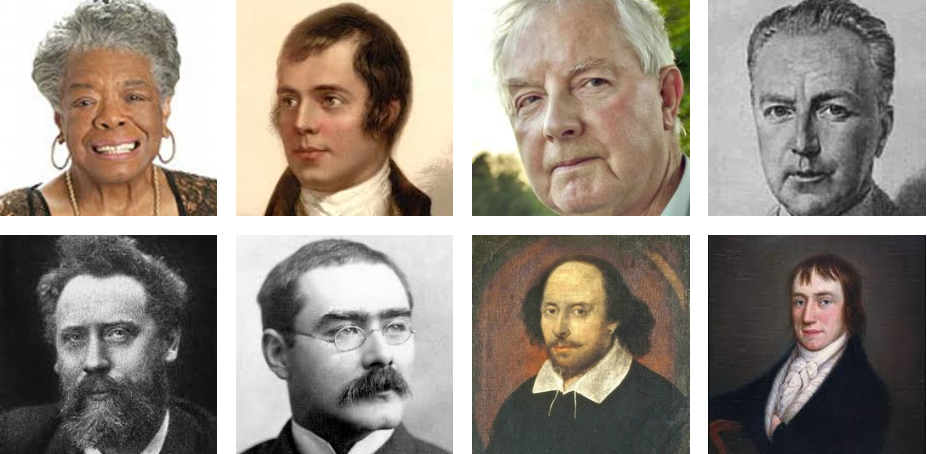
 RSS Feed
RSS Feed